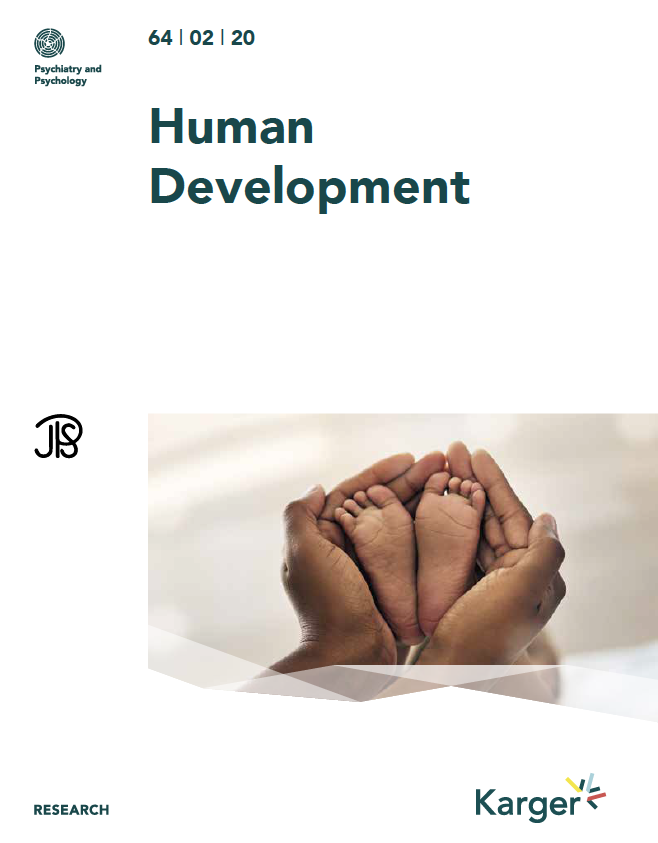Membership in The Jean Piaget Society
JPS has an annual membership fee of $50 for regular members and $30 for students, post-docs, emeritus or retired members. We offer a $25 membership fee for members currently residing in developing countries. This fee will cover your membership for a calendar year.
Membership includes Human Development journal privileges, discounted conference fees, access to select issues of the Genetic Epistemologist, access to the How Ideas Travel Podcast Curriculum page and regular communications from the Society.
Human Development
The official journal of the Jean Piaget Society
JPS members have access to this quarterly journal as part of their annual membership benefits.
Distinguished by its international recognition since 1958, Human Development publishes in-depth conceptual articles, commentaries, and essay book reviews that advance our understanding of developmental phenomena. Contributions serve to raise theoretical issues, flesh out interesting and potentially powerful ideas, and differentiate key constructs. Contributions come primarily from developmental psychology. Contributions are also welcomed from varied disciplines, including anthropology, biology, education, history, philosophy, psychology, and sociology.
Please login here to get access to Human Development under Membership Resources.

Awards
Please see our Awards Page for more details.
JPS Award for Distinguished Contributions to Development Science
The Jean Piaget Society (JPS) seeks nominations for the Award for Distinguished Contributions to Developmental Science. The nomination letter should include descriptions of: (a) contributions to developmental science that are aligned with the aims of the Jean Piaget Society to further an understanding of the developmental construction of knowledge; and (b) the nominee’s involvement with the Jean Piaget Society, which may include Board membership and attendance at, presentations at, or organizing of annual meetings. We are especially interested in scientists who have made important contributions to developmental science and JPS, and we encourage nominations of those whose work has been generative and broadened perspectives in different ways, including through mentorship, collaborations, and interdisciplinary work. Given the nature of the award, it is expected that this award will be given to senior scholars in field. Nominations should include a CV and a nomination letter of 2-4 pages describing the nominee’s achievements and their impact on the field. Up to 3 letters of support can be submitted with the nomination package.
JPS Early Career Award in Developmental Science
The Jean Piaget Society (JPS) seeks nominations for a newly established Early Career Award in Developmental Science. Recognizing individuals’ different career trajectories, nominees must be within 10 years of receiving their Ph.D. Nominations should include a CV and a nomination letter of 2-4 pages describing the nominee’s work, including its coherence and broader impact on the field, as well as a statement regarding how the nominee’s work connects to the mission and aims of JPS. The letter also should describe the nominee’s involvement in the Jean Piaget Society (e.g., membership in the Society and attendance and presentations at annual meetings). Either self-nominations or nominations by others familiar with the nominee’s work are acceptable. The winner will be invited to attend and present at talk at the conference.
Jean Piaget Society Doctoral Dissertation Prize
According to the deed establishing the prize, its purpose is to “encourage a new generation of scholars to pursue empirical and theoretical studies of children’s construction of knowledge by integrating insights from developmental epistemology, biology, psychology, evolutionary theory and education. To that end, this prize will be awarded to a new scholar who will deliver at an annual meeting of the Jean Piaget Society an address based upon her or his dissertation on an historical, epistemological or empirical subject. The prize will be given to the submission that best continues the spirit of Piaget – a study grounded in a firm knowledge of, but not limited to, the work of Piaget and Inhelder.”
Any doctoral dissertation originating from any country, from psychology, philosophy, education, history of science, evolutionary biology or related fields that concerns the topic of knowledge and its development will be considered. Empirical work, rigorous demonstrations of educational methods, epistemology, historical analysis of ideas, evolutionary theory or explorations of Piaget and Inhelder’s late process theory are some examples of the topics that may be submitted. The quality of the work will be paramount: the work need not have originated from the point of view of Piagetian theory, but knowledge of the theory should be demonstrated in the winning submission, to help explain how the work furthers the ongoing study of the interdependence of knowledge and development.
The mission of the prize is not to look backwards but to promote exciting new discoveries – discoveries that recognize that the study of the development of knowledge begun by Piaget, Inhelder, and their many collaborators is a living, continuing tradition that reverberates in many rich and surprising ways through many disciplines.
The prize consists of $2000 plus reimbursement of reasonable travel costs and meeting registration fees, and will be given to the most outstanding summary submitted to the prize committee of a dissertation completed and approved within the 24 months preceding the deadline for submission to the annual symposium meetings of the Jean Piaget Society.
Eligibility
A candidate must be a student, student member, postdoctoral researcher or new regular member of the Society for the current or upcoming year. Nonmembers may submit for the prize, but they must pay nonmember conference registration fees by the conference date. (A nonmember’s conference registration includes a one-year membership.)
Submission Rules
All materials submitted to the prize committee, and the presentation at the conference, must be in English, although the original dissertation may be in any language.
Candidates must follow the regular procedures to submit to the JPS conference a work based upon their dissertations completed and approved in the 24 months preceding the submission deadline. The submission may be submitted either as a stand-alone paper or as a part of a symposium. In addition, candidates must submit to the prize committee an abstract of the dissertation not to exceed 2000 words. Send submissions to: Larry Nucci, JPS Prize Committee Chair: nucci@berkeley.edu.
The prize committee will consider only applicants whose papers have been accepted for the conference. The committee will first judge the submissions blind based on the 2000-word abstract. Approximately three submissions will be chosen as finalists. Then, to ensure that the doctoral dissertation is a completed work, and to facilitate judging its importance, finalists will be asked on short notice to submit the following to the prize committee:
- A pdf of the completed dissertation
- A pdf of a signed signature page for the final approved document;
- One letter of recommendation from someone who has read the entire dissertation (preferably a doctoral dissertation advisor or another dissertation committee member) to help the committee judge the significance of the work in the context of its discipline;
- A brief curriculum vitae of the candidate, to evaluate the place of the work in the totality of his or her work to date.
Upon receipt of the requested information from the finalists the committee will decide upon the winner of the prize.
The abstract submitted for the prize must be suitable for a 20-minute presentation at the Jean Piaget Society meeting. It may be accompanied by figures, tables, and some references on a maximum of ten PowerPoint slides. Submissions with no references will not be considered. Minor revisions in the winning paper will be permitted before it is presented.
The due date for submissions for the prize will be the same as the due date for submission of abstracts for the Society’s annual conference, The winner, finalists and other applicants will be notified of their final statuses around the time of conference acceptance in February.
The winning submission will be noted as such in the conference program next to the slot for its presentation. The program will also mention the winner and the other finalists along with the titles of their dissertations and the names of their doctoral institutions.
Questions/submissions should be directed to Larry Nucci, Awards Committee Chair: nucci@berkeley.edu
Pete Pufall Travel Awards
Please note that no travel awards will be offered in 2021 due to the virtual format of our conference.
We are pleased continue to offer two travel awards of $400 each plus free conference registration to two Emerging Scholars, one residing in the U.S.A. and one international award. These awards are made possible by a generous gift of the Pufall Family. More information on applying for these awards is contained in the Call for Papers.
NOTE: To be eligible, the first author (presenting author) must be a graduate student or post-doctoral fellow.
Emerging Scholars
The Emerging Scholars group is comprised of juniors scholars of the Jean Piaget Society. Emerging Scholars have the opportunity to attend Roundtable sessions and the Emerging Scholars dinner at our annual conference.
